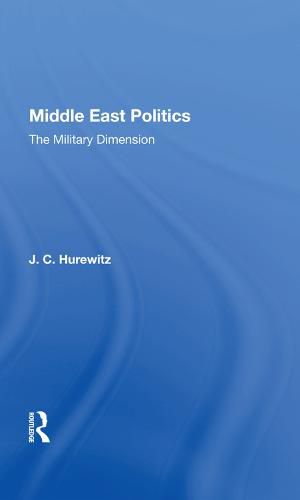Readings Newsletter
Become a Readings Member to make your shopping experience even easier.
Sign in or sign up for free!
You’re not far away from qualifying for FREE standard shipping within Australia
You’ve qualified for FREE standard shipping within Australia
The cart is loading…






The Arab-Israel Six Day War in June 1967 riveted world attention on the huge quantities of sophisticated weapons amassed in the arsenals of the Middle East - and left in its wake tangled political-military dilemmas and the intensification of the most dangerous arms race in the nonindustrialized world. How do major upheavals spread across borders so easily in the Middle East? What is the role of the military in the process of modernization? How can the rash of military coups be explained? Why is Israel, the most vigorous democracy in the Middle East, also the most vigorously mobilized and armed nation? J. C. Hurewitz, Professor of Government at Columbia University’s School of International Affairs, believes the answers to these and other pressing questions of Middle Eastern politics can be found only in a thorough examination of civil-military relations in each country, whether it is under military rule or not. The Middle East, as defined in this book, comprises eighteen states, stretching from Morocco to Afghanistan and Pakistan. Probing the role of the military in each state, the author assesses such other factors as the geographical and regional influences on specific national developments. Dominating all are the ramifications of the competing American and Soviet policies for the region. Through his analysis of the cold war tactics of the two Great Powers, and of the bewildering arms races and the confusion of military politics that these tactics have engendered, Professor Hurewitz brings into much clearer perspective the options for the West, and particularly for the United States, in this area. He has provided, in sum, an informative and fully documented study of the whole interplay of domestic, regional, and international politics in the postwar Middle East.
$9.00 standard shipping within Australia
FREE standard shipping within Australia for orders over $100.00
Express & International shipping calculated at checkout
The Arab-Israel Six Day War in June 1967 riveted world attention on the huge quantities of sophisticated weapons amassed in the arsenals of the Middle East - and left in its wake tangled political-military dilemmas and the intensification of the most dangerous arms race in the nonindustrialized world. How do major upheavals spread across borders so easily in the Middle East? What is the role of the military in the process of modernization? How can the rash of military coups be explained? Why is Israel, the most vigorous democracy in the Middle East, also the most vigorously mobilized and armed nation? J. C. Hurewitz, Professor of Government at Columbia University’s School of International Affairs, believes the answers to these and other pressing questions of Middle Eastern politics can be found only in a thorough examination of civil-military relations in each country, whether it is under military rule or not. The Middle East, as defined in this book, comprises eighteen states, stretching from Morocco to Afghanistan and Pakistan. Probing the role of the military in each state, the author assesses such other factors as the geographical and regional influences on specific national developments. Dominating all are the ramifications of the competing American and Soviet policies for the region. Through his analysis of the cold war tactics of the two Great Powers, and of the bewildering arms races and the confusion of military politics that these tactics have engendered, Professor Hurewitz brings into much clearer perspective the options for the West, and particularly for the United States, in this area. He has provided, in sum, an informative and fully documented study of the whole interplay of domestic, regional, and international politics in the postwar Middle East.